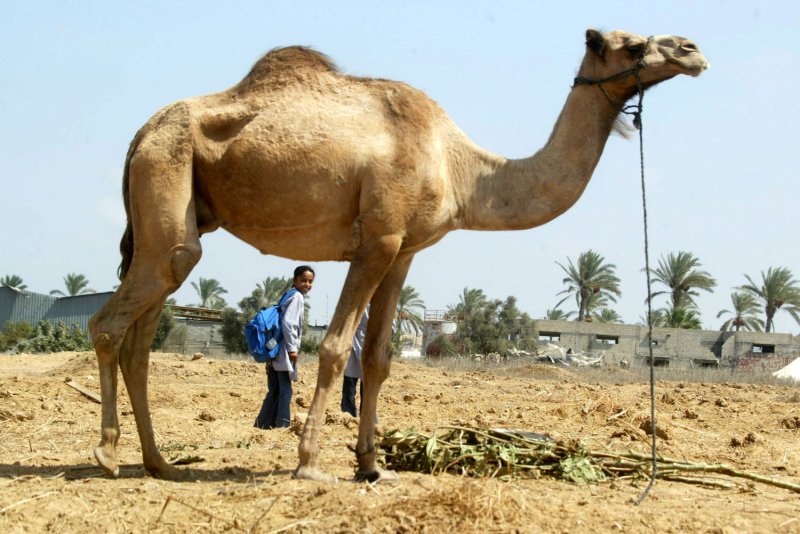MERS-CoV antibodies found in 50-of-50 camels in Oman. (UPI photo/Ismael Mohamad). |
License Photo
BILTHOVEN, Netherlands, Aug. 9 (UPI) -- Antibodies specific to Middle East respiratory syndrome coronavirus were found in all samples from dromedary camels in Oman, researchers in the Netherlands say.
Dr. Chantal Reusken of the National Institute for Public Health and the Environment in Bilthoven, the Netherlands, said recent research showed MERS-CoV could replicate in cell lines taken from bats and was closely related to a bat coronavirus in circulation.
However, it seemed unlikely the virus -- 94 confirmed cases with 46 deaths worldwide -- was transmitting directly from bats to humans, given the generally shy and nocturnal habits of these creatures, Reusken said.
Reusken and his international team gathered 349 blood serum samples from a variety of livestock animals, including dromedary camels, cows, sheep, and goats, as well as from some animals closely related to dromedaries.
The animals were from a variety of different countries, including Oman, the Netherlands, Spain and Chile. This investigation is the first reported animal serological study for MERS-CoV, Reusken said.
The researchers analyzed the blood serum samples for the presence of antibodies specific to MERS-CoV, as well as antibodies reactive to SARS coronavirus, and another strain of coronavirus labelled HCoV-OC43, which can also infect humans, and is closely related to a bovine form of the virus, Reusken said.
The study, published in The Lancet, found antibodies specific to MERS-CoV were found in all 50 serum samples taken from dromedary camels in Oman. The Oman samples originated from a number of different locations in the country, suggesting that MERS-CoV, or a very similar virus, is circulating widely in dromedary camels in the region.
The study found no MERS-CoV antibodies in the blood serum taken from 160 cattle, sheep and goats from the Netherlands and Spain, but lower levels of MERS-CoV-specific antibodies were found in 14 percent of serum samples taken from two herds of dromedaries of 105 camels from the Canary Islands, not previously known to be a location where MERS-CoV is circulating. MERS-CoV deaths have been reported in France, Italy, Jordan, Qatar, Saudi Arabia, Tunisia, Britain and the United Arab Emirates.
In addition, no antibodies specific to the virus were detectable in tests on 34 animals closely related to the dromedary, such as Bactrian camel, alpaca and llama sampled in the Netherlands and Chile, the study said.
"As new human cases of MERS-CoV continue to emerge, without any clues about the sources of infection except for people who caught it from other patients, these new results suggest that dromedary camels might be one reservoir of the virus that is causing MERS-CoV in humans," the study authors said in a statement.
"Dromedary camels are a popular animal species in the Middle East, where they are used for racing, and also for meat and milk, so there are different types of contact of humans with these animals that could lead to transmission of a virus."















